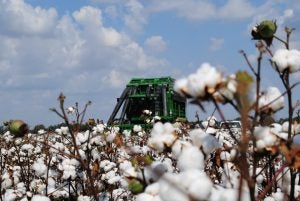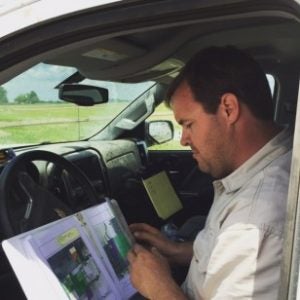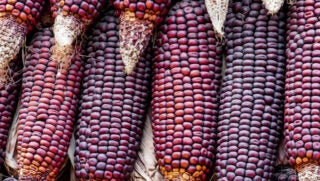For some, receiving a distinguished award would conclude a job well done. For Jeremy Jack, that is not the case and “done” is not an option.
Jack, CEO and COO of Silent Shade Planting Company, was the recipient of the Bayer CropScience Young Farmer Sustainability Award in 2013 — but he says their operation has continued to make great strides and grow tremendously over the past three years.
Jack and his team plant roughly 12,000 acres of cotton, corn, soybeans, rice, wheat, and peanuts in the Mississippi Delta.
Since receiving the honor in 2013, Jack has been focused on not only finding better ways to care for their land, but for their team, too. With the addition of Elizabeth Jack and Dr. Trey Koger, Silent Shade has been able to put a greater emphasis on creating a higher-quality work environment as well as an emphasis on research.

According to Jack, sustainability isn’t an item to check off the farm’s list — it’s an evolving and ongoing process.
“We’ve been able to make great strides with technology. So now I’m able to turn my wells on, off, check my moisture in the ground and run the operation [from an irrigation standpoint] from the beach if I wanted to,” Jack said.
Three years ago, software wasn’t good enough to do that. And though technology has advanced, oftentimes it’s the users who are caught trailing behind.
“I think one of the hardest and biggest struggles with adapting technology is that you’re changing the way you did it before,” Jack said.
Since his sustainability efforts in 2013, Jack dove into the use of soil moisture sensors. With 45 sensors placed throughout the farm, this enables him to know exactly how much moisture his crops are receiving at 4, 8, 12, and 24 inches into the ground.
“Before, we could tell when the ground was watered by walking by and looking. I could dig in the ground with a shovel and say, ‘OK, we’ve still got good moisture here’, and that’s just how we did it,” Jack said.
Because of the use of soil moisture sensors, Jack is able to see where the current moisture setting is, when they will run out, and is then able to look at the weather forecast and see when the next rain should be. In the past it was always safe to error on the side of too much water verses not enough — now, the extra water is not necessary, Jack said.

While many things have been added to the operation, some techniques stand the test of time and continue to be used — such as variable rate fertilizer and chemicals. With the use of a plane, Silent Shade has been able to not only take advantage of variable rate, but take advantage of it at 200 mph.
As an outsider looking in, having the goal of ultimate sustainability for your operation can be overwhelming and oftentimes intimidating. Jack indicates that there are two ways of looking at sustainability: the immediate impact and the long-term impact.
While immediate impacts are measurable and often more tangible, the long-term impacts are what Jack’s focus is on right now.
“We could dig another well into the aquifer, and that would give us another irrigation system, but all we would be doing is taking another straw and putting it into the same cup. That’s more people drinking out of the same cup,” Jack said. “By using surface water (and not using as much water period), that’s going to make sure that my son and the next generation have the resources they need and even more opportunity than we did.”
As an operation that has experienced major change and success over the years, the goal has remained the same: to produce more while utilizing less.
“If you’re using less not because you want to save money, but using less because you don’t need to be wasteful, it’s a good business practice,” Jeremy said.
For Silent Shade, good is not necessarily good enough. While proud of their efforts and accomplishments, the plan is to continue to stay the path.
“Our goal has always been to find ways to produce more while utilizing less, and our plan is to continue to improve that. Until we can look at all the land and it is in great condition — erosion, water usage and everything else is just perfect — that is what we are going to continue and try for,” Jeremy says.
While improving their own operation is the main goal, another important component to their sustainability plan is to share their findings and successes with other farmers and the general public through the Silent Shade website, Facebook page and quarterly newsletter.
“We get a lot of our ideas from other farmers. We didn’t think of it all ourselves so it’s our job to share what we do with others,” Jack noted.
For more information about Silent Shade Planting Company, visit www.silent-shade.com. Here is Jack’s video from when he won the Bayer CropScience Young Farmer Sustainability Award:


